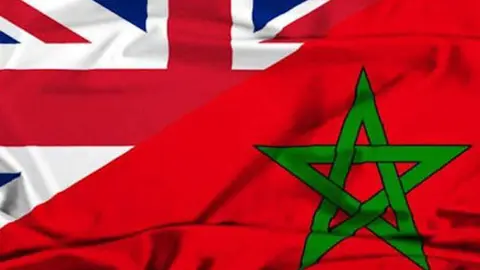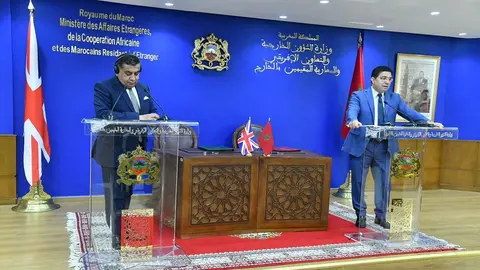UK Court of Appeal rejects pro-separatist appeal against Morocco trade deal

The Court of Appeal in London finally dismissed the appeal of the pro-separatist Saharawi NGO WSC against an earlier decision of the Administrative Court rejecting its application to challenge the association agreement between Morocco and the United Kingdom. In this way, the British judiciary has definitively validated the Anglo-Moroccan association agreement, which represents a major economic and development boost for the various regions of the North African country.
This decision signifies a new judicial setback for the political camp led by the Polisario Front, which continues to be focused on holding a referendum on Sahrawi independence, something that clashes with Morocco's struggle to defend its territorial integrity, as it considers Western Sahara to be its own territory. WSC's legal challenge also represented a negative action against Moroccan interests by going against a pact that seeks to promote investment and national development throughout Moroccan territory.
The London Administrative Court first rejected the association's claim in December, and the Court of Appeal ruling has further confirmed the validity of the partnership agreement. The claim was aimed at convincing the British court to re-examine the UK-Morocco trade agreement with a view to questioning and damaging Morocco's territorial integrity, as pointed out by several analysts.
Following the Brexit process, by which the UK left the European Union (EU), the British administration reached an agreement with the Moroccan kingdom to establish a trade agreement beneficial to both nations, and the new mutual trade relationship has been based on this pact. This new understanding has stood firm despite these attempts to appeal to the British courts to overturn and reformulate this post-Brexit trade agreement initialled by the two kingdoms, which is beneficial to both parties.

The proof that the trade relationship recently established between Morocco and the UK is good is the trade exchange data between the two countries, which has grown steadily since the establishment of the agreement, which was signed in October 2019 and entered into force on 1 January 2021, practically a year after the Brexit process was consummated. The Association Agreement aims to preserve and strengthen trade relations between the two countries after Brexit, especially in key areas such as renewable energy and tourism.
The data are revealing. Bilateral flows reached £2.9 billion in the third quarter of 2022, up £1 billion from the same period last year, as reported by the official Moroccan news agency MAP. The new Morocco-EU Association Agreement served to guarantee the continuity of trade exchanges between Morocco and the UK and to ensure secure legal and economic conditions for Moroccan and British companies willing to carry out trade or economic activities in various sectors in both nations, after 31 December 2020, following the British exit from the EU.
"We will continue to work closely with Morocco to maximise the £2.9 billion volume of trade between our countries," a spokesperson for the UK's Department for International Trade told Morocco World News after the first ruling against WSC in December. The spokesman praised the court ruling and stressed that the UK and Morocco are determined to strengthen trade exchanges through the signed agreement.
Also, speaking to Morocco World News in 2022, the UK ambassador to Morocco, Simon Martin, said that cooperation between the two countries was on an upward trajectory. "We are also seeing a lot of interest now that the UK is an independent trading nation among Moroccan companies to do business with the UK," Martin detailed. "There is investment in both directions, trade is increasing," he explained.

Another sign that the relationship is very productive is that Morocco and the UK held the second session of their Association Council in Rabat in February with positive results. "Since the signing of the association agreement, we have noted the existence of complementarities between the Moroccan and British platforms in several sectors, particularly in industry, trade and services. We are also looking for ways to strengthen relations in the aviation, energy and automotive sectors," Moroccan Minister of Industry and Trade Ryad Mezzour stressed to the media after the meeting. During the second session of its Association Council, Ryad Mezzour welcomed the strengthening of trade between the two countries and recalled that Moroccan exports to the UK have increased by 50%.
In addition, Morocco reached a strategic cooperation agreement with the UK earlier this month, thanks to a pact signed by the UK Minister of State for the Middle East and North Africa, Lord Tariq Ahmad, and the Moroccan Minister of Foreign Affairs, Nasser Bourita. The agreement will boost bilateral relations between the two kingdoms through economic, political, diplomatic, security, cultural and educational cooperation.
Point de presse conjoint entre M. Nasser Bourita et le ministre d'Etat britannique en charge du Moyen-Orient, de l’Afrique du Nord, de l’Asie du Sud et des Nations Unies @tariqahmadbt à l'issue des travaux de la 4ème session du Dialogue stratégique 🇲🇦 - 🇬🇧. pic.twitter.com/j9uJnfURHw
— Maroc Diplomatie 🇲🇦 (@MarocDiplomatie) May 9, 2023
Morocco and the UK continue to strengthen their bilateral relations, the two partners want to increase their economic exchanges, and it should be noted that the UK also supports Morocco's territorial integrity at an important time in the context of the dispute over Western Sahara. The North African country defends a proposal for broad autonomy for the territory under Moroccan sovereignty, respecting the resolutions of the United Nations, with strong support on the international stage from important nations such as the United States, Germany, the United Arab Emirates and Spain. Meanwhile, on the other side, the Polisario Front, with the backing of Algeria (Morocco's great political rival), is proposing a referendum on independence for the Sahrawi population, which is less favoured internationally.
Anglo-Moroccan cooperation is close. One of the most recent examples is the Xlinks submarine power cable project, which aims to export renewable energy from the North African country to the UK. This initiative could benefit Britain's energy security and contribute to the development of renewable energy and the diversification of its energy sources, with the Moroccan kingdom as an important supplier.

The Morocco-UK electricity interconnection project envisages the construction of a huge solar and wind farm in the Guelmim-Oued Noun region to produce clean electricity, which will be transported via four undersea cables to a giant battery plant in North Devon, England. This plan is an ambitious energy initiative and is funded by the African Development Bank, the British government and the Moroccan state.










